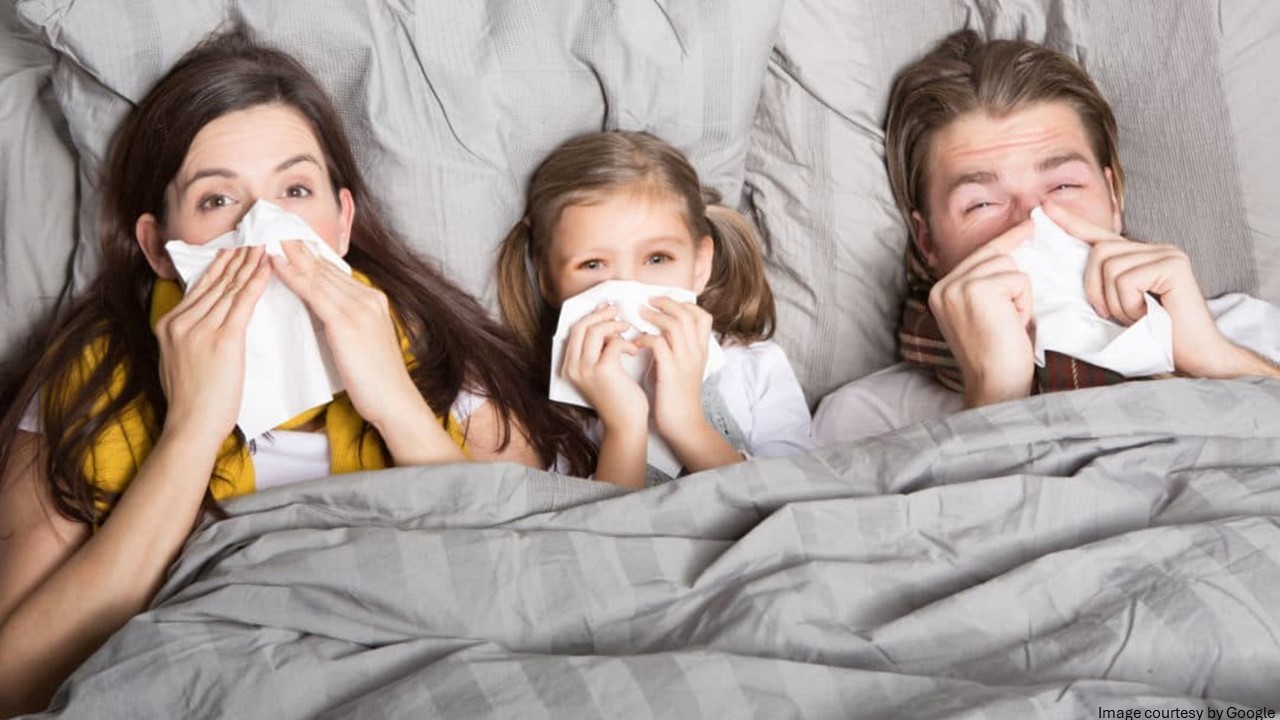Influenza, commonly known as the “flu,” is an extremely contagious respiratory illness. Major flu causes include influenza A or B viruses. The flu attacks are usually in winter and early spring. The flu b and a virus hit the body by attacking through the upper and lower respiratory tract.
The common cold and flu are both contagious viral infections of the respiratory tract and although the symptoms resemble each other, the flu is worse. A cold may drag you down, but the flu fever can make you shudder at getting out of bed.
Signs of flu or flu symptoms
The flu symptoms usually develop within one to three days of becoming infected. Most people feel better within a week after getting affected. However, you may have a lingering cough and feel tired for several weeks. Flu-like symptoms can be identified with any of the following:
- a sudden fever – a temperature of 38C (100.4F) or above
- a dry, chesty cough
- a headache
- tiredness and weakness
- muscle pain
- joint pain
- diarrhoea or abdominal pain
- nausea and vomiting
- a sore throat
- a runny or blocked nose
- sneezing
- loss of appetite
Flu Treatment
Knowing the action plan may help you feel better earlier and prevent others from getting sick if you have the flu virus.
- Caring for a person with flu:
- Know common flu symptoms in adults and kids and when to seek medical care.
- Have the sick person rest and lie down if running a fever due to influenza symptoms.
- Allow the sick person to judge what bed covers are needed. A person with a high fever may feel very cold and want more blankets.
- Use flu medication, such as acetaminophen or ibuprofen, to reduce fever after consulting your physician. Follow the package label or your health care provider’s suggestion for reducing fever, headache, and muscle, joint, or eye pain.
- Make the sick person drink water as much as they can.
- Give light foods as the person wants. Fluids are more essential than food in the initial days when the fever is at its highest.
- Do not smoke around a sick person.
- Have the sick person gargle. Use lozenges or hard candy for a sore throat.
- Clean your hands before and after caring for a sick person and after coughing or sneezing. The infected person should clean his hands, too.
- Don’t touch your eyes, nose, or mouth. Germs usually spread this way.
- You should wear a mask while caring for a sick person.
- When to seek medical care- Call your health care provider within 48 hours if you or anybody else is down with flu:
- Have seasonal flu symptoms.
- Have signs of influenza-like not able to drink enough fluids, dark urine, or feeling dizzy when standing are symptoms of not having enough fluids, a fever of 100°F or higher for more than three days, then feeling better, and then a fever or a sore throat as other signs of the flu.
- Go for medical care if you have shortness of breath, cough up blood, pain or pressure in the chest while breathing, chest pain, especially if you have heart diseases like angina or congestive heart failure, problems in maintaining body balance, walking, or sitting up, or becoming confused.

Natural flu Remedies
What to do for flu? Well, here are some of the natural remedies to relieve influenza b symptoms:
-
- Drink liquid – The influenza virus can dehydrate you, especially if you have vomiting or diarrhea. So ensure to take enough fluids. The water is fine; fruit juices and electrolyte beverages are also advisable.
-
- Be a couch potato – Listen to your body and its needs. If it’s saying not to exercise, then don’t. If it asks you to spend all day in bed, do it like that. Rest is another way of promoting the body’s ability to fight infection.
-
- Humidify – Breathing moist air assists in easing nasal congestion and sore throat. The best method is to use a steam vaporizer. Clean it regularly to ensure it’s free from germs.
-
- Make a tent – Take a water container to a boil and remove it from the heat. Cover your head with a towel, close your eyes, and lean over the water under the tent; breathe deeply through your nose for 30 seconds (you can also call it taking steam)
Most of these remedies have been helping to reduce the duration of flu symptoms and may also help you feel better while your body fights the virus.
It’s good to visit your doctor at the first signs of flu, body aches, and a fever over 102 degrees F. Antiviral flu drugs you get from your doctor may shorten your illness, but you must take them within 48 hours after symptoms start.



